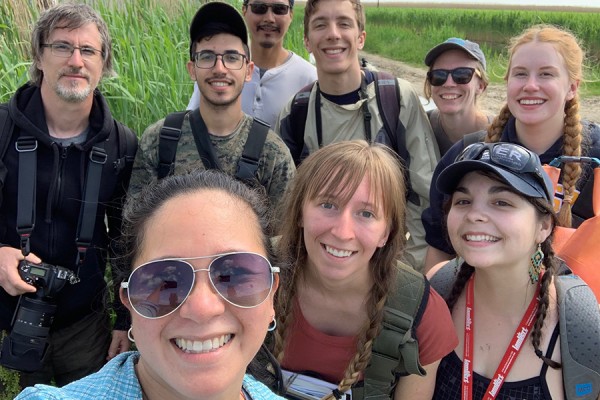 UWindsor students had a week-long summer field course at the Walpole Island First Nation Territory. Photo credit Healthy Headwaters Lab.
UWindsor students had a week-long summer field course at the Walpole Island First Nation Territory. Photo credit Healthy Headwaters Lab.
A new field course this summer is a step towards establishing relations between the sciences at the University of Windsor and the Walpole Island community.
The course, titled “Traditional Ecological Knowledge and the Environment,” offered students the opportunity to experience the amazing array of flora and fauna of Bkejwanong, or Walpole Island First Nation Territory, when the tallgrass prairies, savannas, grasses, and wildflowers were at their peak.
“This course is the culmination of two years of relationship building,” says Candy Donaldson, research associate in community and translation with the Great Lakes Institute for Environmental Research (GLIER).
“We invited people from Walpole to come to the university campus, and to tour our space. We reciprocated by going out to Nindawaabjig, Walpole Island’s Heritage Centre. There was a lot of back and forth — building the course content as a team from the beginning.”
The students also had cultural training prior to their week-long trip to Walpole from June 2 to 7. They learned about residential schools, reconciliation, and how to properly conduct themselves on the island.
Clint Jacobs, heritage manager at the Walpole Island Heritage Centre, took on the role of instructor for the course.
“This was a grounded and mindful journey for the students,” says Jacobs. “Where they were able to learn how to be aware of and appreciate their place in nature. My wish is for the students to be able to come away from this course connecting the land with their heart.”
Donaldson notes there are many different ways of seeing place and nature; science is just one.
“This field course offers the student different ways of being in your environment. Place is where a way of knowing comes from, and we learn our science by observing our place,” she says. “By working with indigenous instructors, we were able to present this environmental perspective to the students.”
Several faculty from the University of Windsor were also involved in the field course, including GLIER professors Catherine Febria and Trevor Pitcher, and dean of science Chris Houser.
“Many faculty want to build these bridges and foster trust-based relationships that open up to possibilities in research,” says Dr. Febria. “We all have a very personal relationship with the Great Lakes, and some of us want to find ways to work together with Bkejwanong/Walpole Island because it is critical to restoring the vitality of the Great Lakes.”
—Darko Milenkovic
